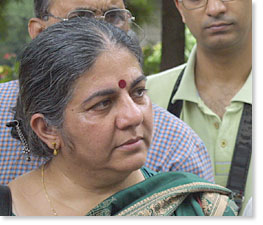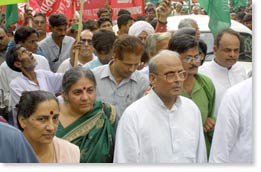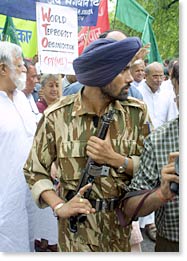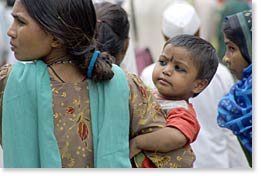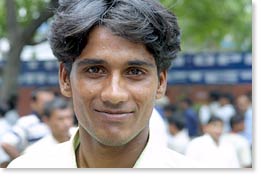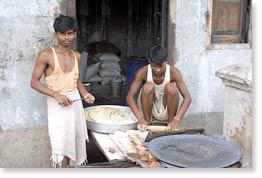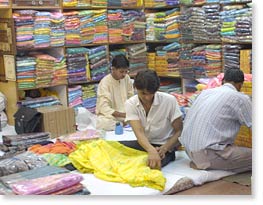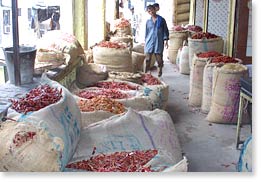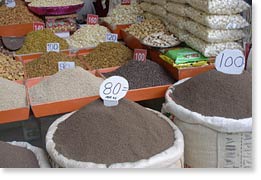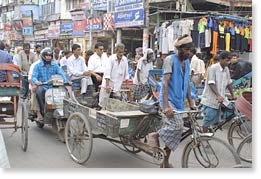|
Interview with Vandana Shiva The Role of Patents in the Rise of Globalization “The recovery of economic democracy is at the heart of recovery of democracy itself.” New Delhi, India
A twist in the history of patents In Motion Magazine: I think sometimes people’s eyes glaze over when hearing about patents and legal matters, but in your book “Protect or Plunder – Understanding Intellectual Property Rights” you describe some interesting history, about how originally patents were used to spread technology but now they have been turned into their opposite. Could you outline how that twist happened? Vandana Shiva: In the early days, the word patent was used for two things. In the case of getting hold of territory, what were issued by kings and queens were letters-patent, which were open letters. Anyone could know that Columbus had been given a right by Queen Isabel and King Ferdinand to conquer and take over any territory on their behalf. But the second meaning, defined around the same time by the Venetian laws on patent, which were the first patent laws, was that a master craftsman could be brought (to a country), because technology at that time was craft technology, and if a country could not make glass they would give to the master craftsman apprentices and say, “Train our people in this art.” “Train our people to make glass.” “Train our people to make steel.” “Train our people to make textiles”, and we will give you an exclusive right (to make these products) for seven years while you are training people. The period of the patent was seven years because it took seven years to learn a craft. After that seven years was over, the master craftsman went back to wherever he belonged and you had all the apprentices available in the country to spread that technology as a free public good. This was the pattern throughout the early use of patent law. Then you get slow shifts with the rise of industrialism. As big industry became a major economic interest, they started to use technology as an instrument of monopoly. Patents became the way to say, “Only we will use this technology”. The way they expanded this power was, on the one hand, extending the life of patents. It went from seven years to fourteen. Now, under WTO (World Trade Organization), for the first time it is twenty years -- extendible in a period where technologies are becoming so obsolete that if you have that kind of monopoly for twenty years you are totally controlling the technology. And the second thing is constantly increasing the domain over which patents will apply. For example, in India’s patent law agriculture could not be touched. Agriculture was free of monopolies. And in medicine you could not have a product monopoly. You could not monopolize a medicine but you could monopolize a method of making a medicine. But, medicine has been brought into monopolies. Seed has been brought into monopolies. Cells have brought into monopolies. Genes have been brought into monopolies. Animals have been brought into monopolies. Basically, the ’80s saw a twist in this and a lot of it had to do with the rise of the big industry and their convergence into one set of giants, which are the health giants, the pharmaceutical giants, the gene giants controlling all life. In Motion Magazine: You’ve also said that with the rise of other countries in the world, with their own manufacturing systems, markets started to slip away but the developed countries still had control of the technology? Vandana Shiva: The thing was that when we were living in a world based on crafts, transferring technology was the objective. But as the world got industrialized, as developing countries shed the colonial burden, imperialistic patent law started to develop. For example, again India, under a 1970 law, developed a very strong medical sector. And I think if WTO had not come on the horizon, India would be providing cheap medicine to American citizens. It’s capable of doing that. But the American citizens, and the African citizens, and the Brazilian citizens, and in the future the India citizens are being told, “You will only buy from these monopolies.” It was a way to de-industrialize Southern countries who had started to build capacity, technological capacity for themselves. In Motion Magazine: So patents have had a very specific role in the latest version of imperialism, in this globalization phase? Vandana Shiva: If you want to have one tool for imperialistic control, it’s patent law under the WTO agreement. It’s in my view the worst of the WTO agreements. It is a totally coercive tool. It has only a negative function: to prevent others from doing their own thing; to prevent people from having food; to prevent people from having medicine; to prevent countries from having technological capacity. It is a negative tool for creating underdevelopment. It’s the privatization of knowledge. I have called it the enclosure, the ultimate enclosure. We had enclosures of land. Now, we are seeing enclosures of biodiversity, life itself. In my book “Biopiracy”, I’ve talked about how this is the last colony. It is the spaces within our minds -- for knowledge. The spaces within life forms for reproduction. A seed cannot reproduce without permission of the patent holder and the company. Knowledge cannot be transmitted without permission and license collection. It’s rent collection from life. It’s rent collection from being human, and thinking, and knowing. Globalization of U.S. patent laws In Motion Magazine: How has the WTO been a forum for the globalization of U.S. patent laws? Vandana Shiva: The WTO has an agreement called Trade Related Intellectual Property Rights agreement (TRIPs), which basically is nothing more than globalization of U.S.-style laws. And its globalization of U.S.-style laws both in content and in process. In terms of content, in the late ’80s when this law was drafted, the United States was the only country that granted patents on life forms. This precedent was set in a 1980 decision on a genetically-engineered micro-organism, subsequent to which was the rise of the biotech industry. The granting of life patents was seen as an imperative both by the industry as well as the government. The U.S. government actually encouraged life patenting. The decision-making was set by the courts, rather than by Congress, never with a public debate, never with a public policy decision on the ethical implications, ecological implications, economic implications of what life patents mean. The second way in which this is a globalization of U.S. law is the fact that it was really U.S. companies which got together, drafted the law, took it to the U.S. administration, then took it to the secretariat of the at-that-time General Agreement on Trade and Tariffs (GATT), which was the precursor of WTO, and as Monsanto, which was one of the companies in the intellectual property coalition admitted in drafting this law, “We achieved something unprecedented. We were the patient, the diagnostician, and the physician all in one. With the broadening of patents to life forms, patents do not just regulate technology they regulate life. They regulate economy. They regulate basic needs. A patent is an exclusive right to make, produce, distribute, or sell the patented product. So, if a patent is granted, for example, on seed it means a farmer who grows a seed cannot save seed from the harvested crop because that is constituted as making the seed and the exclusive right to the seed belongs to the company. It means seed-saving by farmers is now defined as intellectual property theft. Many farmers in the United States have been sued by the corporations for doing something normal in farming, which is saving their seed. Exchanging seed with your neighbor, which is called brown-bagging -- it was not a commercial exercise; it was a mutual give-and-take in society; a social act of exchange for non-profit activity -- has also been defined as an infringement because now distributing is covered by a patent, even if it is not commercial, because the companies interpret that by exchanging seed you are taking the market away from them. Medicine: from healing to profits Also, patents can be given for medicine. For example, in the case of medicine, if there is no patent we can treat people with AIDS with $200 expenditure per year. Indian companies can make it for that cost because they can make them as generic drugs. They are not piracy drugs, which is the way the U.S. pharmaceutical industry talks about them. They are generic in the sense that different processes have been used. The same medicine, the same retroviral, costs $20,000 in the United States because of patenting -- that is the only difference. Which means something which is being made for $200 is being sold to consumers for not just ten times but a hundred times the price. As our prime minister said, the big companies are trying to turn the matter of disease from healing into a matter of profits. There was an attempt made, at the beginning of the TRIPs negotiations, to make it look like the lower-cost production that could happen in the absence of monopolies was piracy. The industry managed to define piracy as absence of monopolies. We want to define monopoly as monopoly and recognize that things like seeds should be accessible to farmers, things like medicine should be accessible to those who are dying of AIDS, and no regime in the world can put profits above people’s lives. In Motion Magazine: Are the same corporations controlling food and health? Vandana Shiva: It’s the same companies. The industry that used to be the chemical industry is also the pharmaceutical industry, is also the seed industry, is also the biotech industry. There is no separation -- and agro-chemical industry. It is all one. In Motion Magazine:You made the statement in your book on patents that there’s always a connection between ecology and equity. Can you talk about that? Vandana Shiva: Ecology is about interactions in the natural world, sustainability of resources. Whether you look at water, you look at biodiversity, you look at anything, conservation happens. Environmental sustainability takes place when people have a stake and a share in the rewards of the conserved resource. If people have the ability to drink water from a well, and look after that well, and will suffer the consequences of contamination, they will not contaminate that well. People who pollute a well or a river are the ones who don’t have to drink from it. Similarly, when it comes to monopolies on intellectual property, conservation is what is sacrificed. It’s the small peasants of the world who have conserved biodiversity. If they have to continue conserving biodiversity, they need to have their rights defended. They need to be able to know that when they plant basmati rice it will be their reward to harvest that basmati. They will not be treated as pieces of RiceTec property. And they need to have a market for their produce. Intellectual property destabilizes both, and in fact, starts to become an incentive for destruction of biodiversity by pressures of the industry for monocultures, on the one hand, but also by not giving people a chance to protect the resources from which they make a living because they are no more their resources. That is why ecology goes hand-in-hand with equity. From theoretical physicist to advocate for biodiversity In Motion Magazine: Could you go over how you started in the field of physics and then ended up where you are today and how that relates to your organizing? Vandana Shiva: I chose to be a physicist. I loved physics from an age when I didn’t even know what the content was but I knew I wanted to figure out how nature works. Einstein was my hero. This is what inspired me. I lived through life training to be a physicist, initially training to be a nuclear physicist and then realizing there’s a dark side to it. I left that to become a theoretical physicist. I worked in foundations of quantum theory. As is typical, I was doing my Ph.D. in Canada and everyone who goes from the South as a scientist stays on and becomes a university professor and I could see, “That’s what I will become.” I wanted to become that. But I said, “I’m not informed enough about how my society works. There is a question in my mind. We have the third biggest scientific community in the world. We are among the poorest of countries. Science and technology is supposed to create growth, remove poverty. Where is the gap? Why is science and technology not removing poverty?” I wanted to answer that question to myself. I said, “I will take off three years. Look at science policy issues. Be a little more educated, socially, and then go back to physics.” That was my chosen life path. I was, in any way, involved in forest protection in the Himalayas, my home, before I went for a Ph.D. I constantly volunteered with a movement of women called Chipko . But when I started to work on science and technology issues, I realized very quickly that they are about resource control. They are not about efficiency. A big trawler in the sea is not more efficient than a small boat. It controls more resources. And denies the small boat. Green Revolution farming is not more efficient. It takes more water and leaves other areas deprived of financial investment, water inputs, everything else. What you really see is technology acting as, what I called in that period, a polarizer of resource access. Very quickly I started to realize that technology issues, ecology issues, social inequality issues, were actually very intimately connected. I did a lot of analysis/writing at that point and I was invited by the United Nations to carry these issues further. Meantime, the Ministry of Environment, seeing some of my reports, commissioned me to look at mining in my valley. I had just had my son, the 21-year-old boy who is walking around (in the office where this interview took place), and I said “perfect”. I had lost my mother at that time, so I said “I will go back, look at this mining, make a break in my science policy, also make a short break from my return to physics. Do the study. He’ll be a little older. But I will also do more work on ecology and the grassroots movement. Did the study. We stopped the mine. I started to do the United Nations work and a huge world unfolded. The Punjab crisis burst which forced me to look at agriculture, ecology issues of agriculture, but also the rise of terrorism linked to unequal development. I wrote my book called “The Violence of the Green Revolution”. 1984 was the year I started to look very, very closely at those issues because we’d had genocide in Punjab. We’d lost our prime minister in that terrorism, which eventually killed 30,000 people. And it was the year of Bhopal. As a result of that gas leak from a pesticide plant, 30,000 people more have died. So, I was just surrounded by these mega-violent epidemics all linked to agriculture and agriculture that was supposed to be progressive. In 1984, I decided that something was wrong and I needed to go to the roots of it. Why has agriculture gone so violent? Why are we so dependent on pesticides -- weapons of mass destruction? The real weapons of mass destruction because they did move from the war industry into agriculture. Focus on biotechnology and patenting After three of four years of looking more closely at agriculture issues, I started to get called into biotechnology seminars because it was the next step. In ’87, at one of these seminars, the industry laid out its grand dream of controlling the world. They talked about needing genetic engineering so that there’s a technology that they have that peasants can’t use so that they can have a monopoly through technology. Patents. Because without it they cannot consolidate power. That was said by Sandoz. Sandoz merged later with Ceiber-Geigy. Sandoz and Ceiber-Geigy became Novartis. Novartis merged with AstroZeneca, which was anyway two independent companies, earlier. All of them merged to become Syngenta. What they had said at that time was, “By the turn of the century we will be five.” In ’87, I said, “I don’t want to live in a world where five giant companies control our health and our food.” I dropped everything else. I left my work on dams and forests and mines. I was doing very broad-scale work on the environment movement then. Dropped everything else. Handed it over to the next generation -- and they were brilliant activists in India -- and moved into a focus on two things: biotechnology and patenting. I tracked the whole TRIPs negotiations through and have followed the biotech industry from the day it wanted to become a giant industry. I have tried to do my best to defend the freedom of people; create seed banks so that farmers have free seed; nature has freedom of diversity; and these monopolies are restrained. Since 1987 to now, which is 16 years, I have had a single pointed attention to prevent imperialism over life itself. In Motion Magazine: When you are working with the various farmers’ organizations, various mass organizations, specifically in India do people consciously learn from what Gandhi had to say? (See photo of Gandhi's working room, the Harijan Ashram by the Sabarmati River, Ahmedabad, Gujarat, India.)Vandana Shiva: Definitely. People very, very much learn from what Gandhi had said. When I brought the TRIPs issues for the first time to farmers’ organizations in India, in ’91 when the first draft of the WTO texts were ready, it was called the Dunkel draft text, I started to tell people what this would imply. It took no time: by ’92, ’93, we had giant farmer rallies. And the title (of the movement) was the Seed Satyagraha -- the non-violent, non-cooperation with laws that create seed monopolies, inspired totally by Gandhi walking to the Dandi Beach and picking the salt and saying, “You can’t monopolize this which we need for life.” On the non-cooperation side we were very inspired by Gandhi. But also on the constructive side, the other side of our work with farmers and farm groups is the creative side of saving seeds, doing agriculture without corporate dependence -- without chemicals, without their seed. All this is talked about in the language that Gandhi left us as a legacy. We work with three key concepts. (One) Swadeshi -- which means the capacity to do your own thing -- produce your own food, produce your own goods. (Two) Swaraj -- to govern yourself. And we fight on three fronts -- water, food, and seed. JalSwaraj -- JalSwaraj is water independence -- water freedom and water sovereignty. Anna Swaraj is food freedom, food sovereignty. And Bija Swaraj is seed freedom and seed sovereignty. (In regard to these fronts) Swa means self -- that which rises from the self and is very, very much a deep notion of freedom. I believe that these concepts, which are deep, deep, deep in Indian civilization, Gandhi resurrected them to fight for freedom. They are very important for today’s world because so far what we’ve had is centralized state rule, giving way now to centralized corporate control, and we need a third alternate. That third alternate is, in part, citizens being able to tell their states, “This is what your function is. This is what your obligations are,” and being able to have their states act on corporations to say, “This is something you cannot do.” The third component is Satyagraha, non-cooperation, basically saying, “We will do our thing and any law that tries to say that us being free is illegal we will have to not cooperate with it. We will defend our freedoms to have access to water, access to seed, access to food, access to medicine.” The death of economic democracy In Motion Magazine: Last time we spoke, you were talking about how to make democracy more viable and you were saying that it comes down to individual participation at an economic level. How would that function? Vandana Shiva: Well, actually any real, true democracy is one in which people can determine the conditions of their living -- their food, their health, their jobs, their livelihoods. These are defined as economic issues. They used to be covered by democratic governance of the representative kind to the extent that before globalization, if you voted someone to power you could put demands on that representative to say, “We need a school in this community, and if you promise you get us a school we are with you.” By and large, it was possible for politicians to come back and deliver their promise because it was within the national sovereign space. But globalization has meant the erosion of national sovereign space. For example, under the agreement on agriculture nobody can guarantee a price to a farmer. Governments cannot go to farmers and say, “We will make sure you get a living price for your farm commodities.” They cannot go to a community and say, “We will defend your jobs and prevent them from being undermined and companies running off to some cheap overseas site.” They cannot offer guarantees on education, they cannot offer healthcare -- the typical things democracy was made of. What we’ve seen is a split of democracy. It’s been emptied out of its economic content, been left with a representative shell of electoral theatrics -- literally. Economic decisions have moved out of the hands of citizens and even of the hands of countries and moved into organizations controlled by corporations like the WTO, and the World Bank, the IMF (International Monetary Fund), and the corporations themselves. What we have is economic dictatorship combined with representative democracy. But representative democracy under economic dictatorship is not able to counter that dictatorship and act as an economic democratic force. (Rather it) moves and leans increasingly into winning votes by polarizing society and dividing society along lines of race, gender, religion, ethnicity. That is why over the ’90s, as globalization has deepened its reach in our communities and countries, fundamentalism, communalism, religious hatred have seen a rise. Because religious fundamentalism, I believe, is a child of the death of economic democracy. In Motion Magazine: Because? Vandana Shiva: Because people without economic rights are left insecure. There is joblessness. They can’t understand the processes leading to it. Ordinary farmers can’t really understand why prices are going down. If you can say, “The prices are going down because some other farmer in some other state is doing something to you;” or, “Your water is disappearing because some other state is doing something;” or, “Your jobs are going because the Moslems are breeding too much;” or in Europe, “The immigrants are coming too fast; or in the United States, “The Mexicans are crossing the border;” it takes no time before the economic insecurity left as a result of globalization mutates into a ready-made ground for political interests to say, “Your job has been taken away by so and so.” “Your security has been robbed by so and so.” That’s the rhetoric that has filled the space as economic insecurity has grown. The recovery of economic democracy In Motion Magazine: How can a farmer, for example, economically become involved? Vandana Shiva: I think the recovery of economic democracy is at the heart of recovery of democracy itself. And it doesn’t stop at that. It goes further into the creation of peace.In a way, we really have three combined challenges, just now. We’ve got the threat of war and violence. We’ve got the threat of economic insecurity, loss of jobs, loss of livelihoods, loss of incomes for farmers. And thirdly, we’ve got this whole situation that our leaders are not representing our will -- the collapse of democracy.
I was just told, yesterday, that 41 billion rupees of losses have been faced by farmers in one state who were sold Monsanto corn. We did a calculation that farmers of Bt cotton, the genetically-engineered cotton, lost a billion rupees in one season. If farmers are saving the seed, growing their crop, they are making reclamation of their economic space. They are giving up chemicals and the pesticides that have contaminated all sources of water in this country, including the soft drinks now. They are not just saving money. They are saving their lives and they are saving public health. By reaching out to consumers and setting up alternate marketing systems, as we do with the Dilli Haat where we have our direct marketing stall, we in Navdanya, my organization, which is the main outlet for organic growers in this country, we bring the produce directly from farmers, and it’s literally their marketing platform.The flow of wealth from South to North In Motion Magazine: The contradiction between knowledge, as a collective process, and patents being the opposite of that … do you think that is related to the fact that wealth has been flowing from one half of the world to the other?Vandana Shiva: North-South inequality is very clearly a result of imperialistic structures being put in place that suck wealth out of the South, put it in the North. That’s exactly why the North looks rich and the South looks poor. Not because human beings in the South don’t know how to create wealth. Everyone knows how to make things, create things. Every one is creative. But when the results of your creativity, productivity are not yours to hold and the results of your labor and creativity are transferred somewhere else the one who takes it becomes rich and the one who’s left without it is the one who stays poor. During colonial rule, this extraction was done through ownership over land. The British came to India to a country, which was richer than England at that time, and every record tells you that. They used to exchange pepper with bags of gold. A sack of pepper used to be equal to a sack of gold. Then they came in as traders, established themselves as rulers. First as the East India Company, which was thrown out in the 1857 Rebellion and War of Independence, then, as the crown which took over the role of the Company and continued to rule.The regions that were the richest, such as Bengal, became the poorest. In 1942, two million people died of famine in the land where there was no shortage of wheat. Amartya Sen got a Nobel prize for saying something so basic, that people did not die because there was not enough food. They died because they had been robbed of their entitlement. That was the basis of his Nobel prize. That is also the basis of noticing inequality. We (Navdanya) have two books on the history of food and farming and we have tracked in them what the wealth of Indian peasants was being used for. Schools were being built in England. Mental asylums were being run by the transfer of peasant wealth into England. That’s why the colonizing empire constantly grew. That’s what land ownership did at that time, which the British institutionalized in this country. Before that we had land use. We had use-of-it right. Not private property in land. The British turned the revenue collectors into landowners and created what they called the permanent settlement and Zamidari system through which wealth would flow to them. The revenue collectors were left as landowners. The original cultivators were left as the dispossessed peasants. What ownership over land, a very distorted ownership of a land, did to indigenous communities at that time of colonialism, ownership over biodiversity, seeds, genes, medicine is doing in today’s world. The biodiversity is in what is called the poorer part of the world. We are biodiversity rich but every year, annually, $60 billion worth of wealth-transfer is taking place because the control over the products is in the hands of the North. Monopolies of patents are in their hands. Monopolies on trade are in their hands. Coffee -- trade jumped from $40 billion to $70 billion over the last few years so there was literally a doubling of trade. One would have imagined a doubling of trade would have left a doubling of incomes in the hands of those who grew the coffee. The incomes of the coffee producers dropped from $9 billion to $5 billion and some of the most dispossessed people of the world today are the coffee growers, as also every other commodity grower. These are amazing mechanisms -- the trade arrangements, trade treaties, intellectual property rights patent treaties. They are doing, once again, in a deeper way what colonialism did and the projections are that 70% of American wealth will be through rent collection, through patents, because the U.S government is not designing America as a society where people are involved in making things. It has dismantled manufacture. It has gone off to China. Pick up anything in a supermarket -- it is made in China. But America would still like to collect returns and that is through intellectual property. So, while people’s jobs are disappearing, the corporate wealth is increasing and then, of course, all the details of the rest of it carry on. There are all these mechanisms of taking wealth from those who work, those who create, to those who control through extremely coercive instruments of power. War is globalization by other means In Motion Magazine: Which is now further enforced by invading other people’s countries? Vandana Shiva: I have said that war is another name for globalization because if you really look at Iraq it wasn’t liberated. American soldiers didn’t come out winning. More of them have died since the so-called war got over. But one thing did happen and that was that corporate America got to enter Iraq and use American tax money in the process. Bechtel got a big contract. Halliburton got a big contract. That is where the whole so-called reconstruction went. This is exactly what globalization does – (for example) put the water of the world in the hands of Bechtel, Suez (Lyonnaise des Eaux), Vivendi (Environment). Globalization is war by other means and war is globalization by other means. In Motion Magazine: It depends on the policy of the leaders of the U.S. at the time? Vandana Shiva: At this point it so happens America is the empire. But one thing we learned with the British Empire is that empires rise and empires sink. Published in In Motion Magazine March 28, 2004 Also see:
|
||||||||||||||||||||||||||||||||||||||||||||||||||||
If you have any thoughts on this or would like to contribute to an ongoing discussion in the  What is New? || Affirmative Action || Art Changes || Autonomy: Chiapas - California || Community Images || Education Rights || E-mail, Opinions and Discussion || En español || Essays from Ireland || Global Eyes || Healthcare || Human Rights/Civil Rights || Piri Thomas || Photo of the Week || QA: Interviews || Region || Rural America || Search || Donate || To be notified of new articles || Survey || In Motion Magazine's Store || In Motion Magazine Staff || In Unity Book of Photos || Links Around The World NPC Productions Copyright © 1995-2018 NPC Productions as a compilation. All Rights Reserved. |


